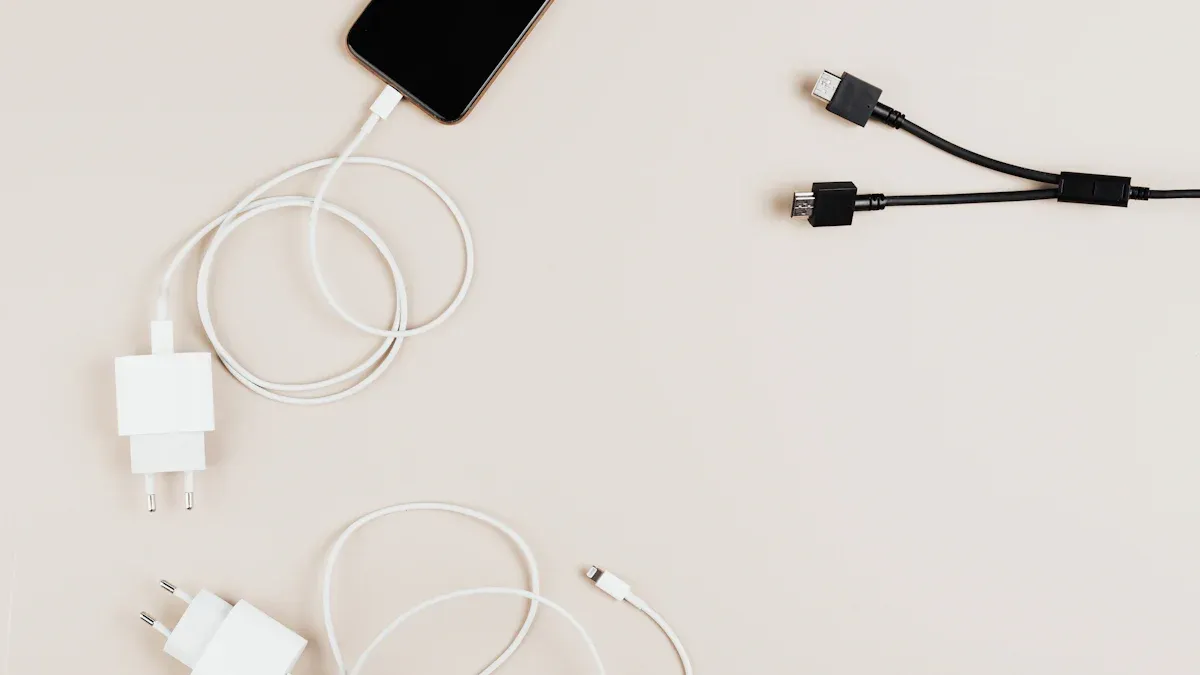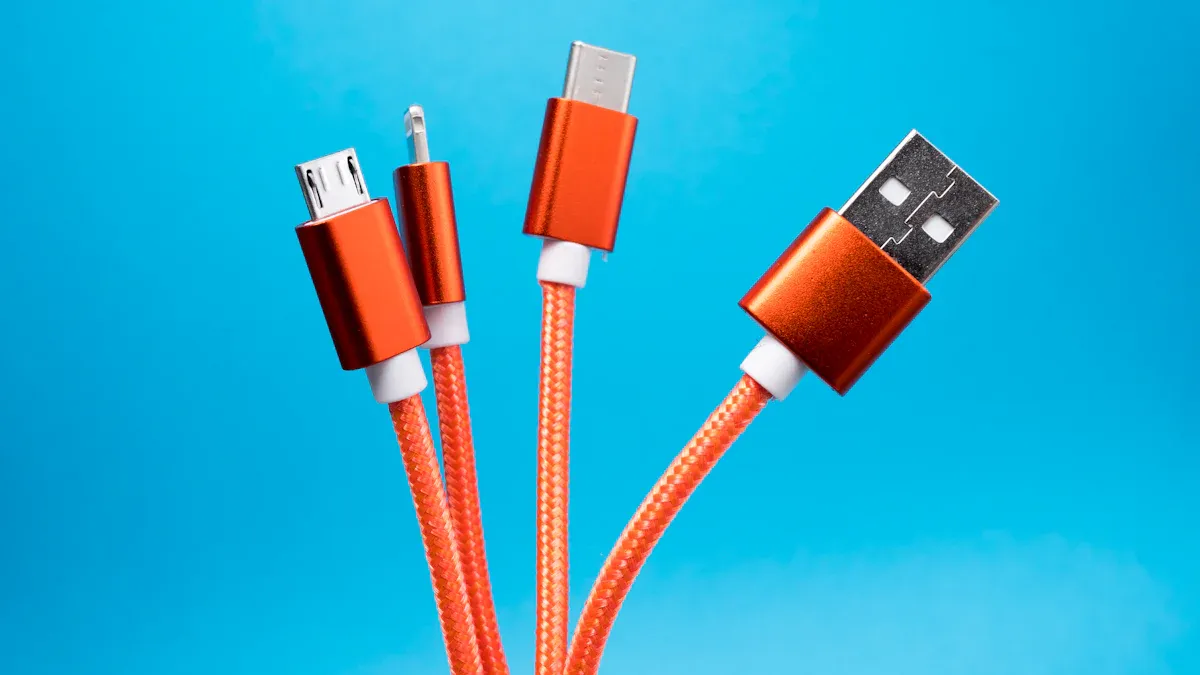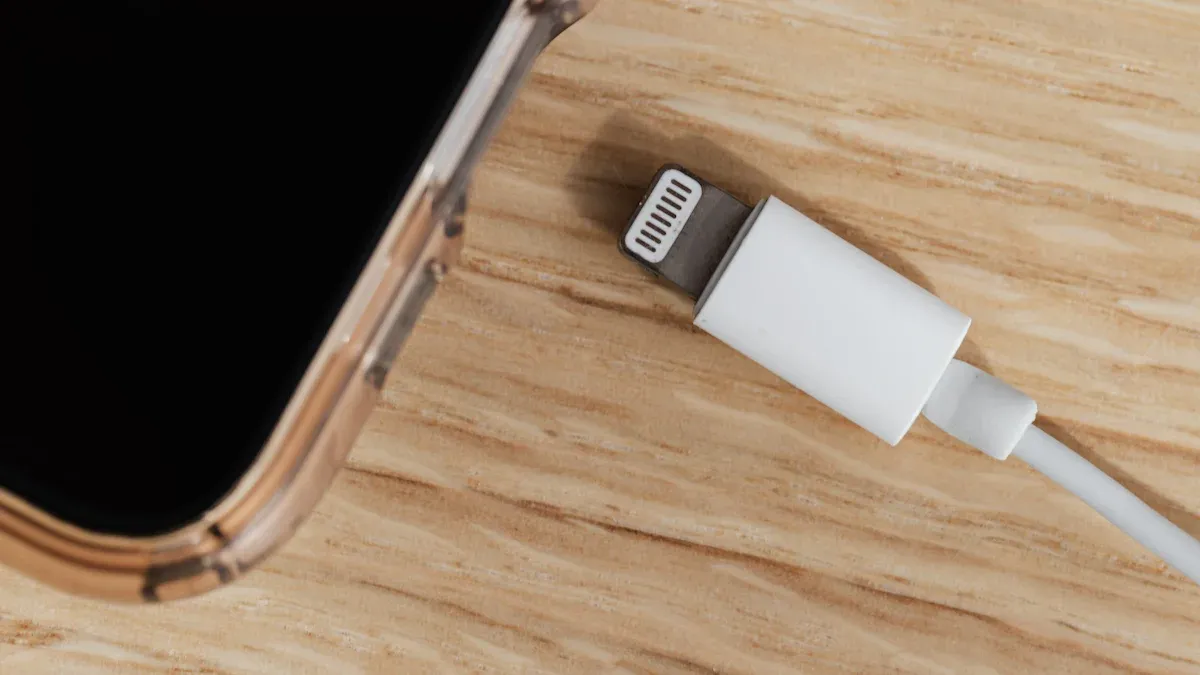A mobile phone cable is a vital tool that connects your device to a power source or another device. It enables charging and facilitates data transfer, such as syncing files or updating software. Standards play a crucial role in ensuring the cable performs safely and reliably. They protect your device from potential damage caused by poor-quality materials or incorrect voltage. Additionally, standardized cables improve compatibility across different devices and brands, saving you from the hassle of finding the right fit. Prioritizing certified cables ensures better performance, whether faster charging or smoother data transfers.
What Is a Mobile Phone Cable?
Definition and functions
A mobile phone cable is a physical connection that links your device to other electronics, such as chargers, computers, or external accessories. It serves two primary purposes: charging your phone and transferring data. When you plug your phone into a power source, the cable delivers electricity to recharge the battery. Similarly, when you connect it to a computer, the cable allows you to share files, update software, or back up important data.
Over the years, mobile phone cables have evolved to meet the demands of modern technology. Early phones relied on proprietary connectors, which were unique to each brand. This made it difficult to find compatible cables. However, the introduction of standardized interfaces like Micro-USB and USB-C has simplified this process. For example, in 2007, the Open Mobile Terminal Platform group agreed to adopt Micro-USB as a common connector for mobile devices. More recently, Apple joined this trend by introducing USB-C in its iPhone 15 series in 2023. These advancements have made mobile phone cables more versatile and user-friendly.
Key components of a mobile phone cable
Every mobile phone cable consists of three main parts: the connectors, the cable itself, and the internal wiring.
- Connectors: These are the plugs at each end of the cable. One end typically connects to your phone, while the other connects to a power source or another device. Common connector types include USB-A, USB-C, and Lightning.
- Cable: This is the flexible cord that houses the internal wiring. It is usually made of durable materials like rubber or nylon to protect it from wear and tear.
- Internal wiring: Inside the cable, thin wires carry electricity and data. These wires are often made of copper, which is an excellent conductor. Some cables also include shielding to reduce interference and improve performance.
Each component plays a crucial role in ensuring the cable works efficiently. For example, high-quality connectors and wiring can support faster charging and data transfer speeds.
Common uses in daily life
You likely use a mobile phone cable multiple times a day without even thinking about it. Here are some common scenarios:
- Charging your phone: Whether at home, in the car, or at work, you rely on a cable to keep your device powered up.
- Transferring files: You might use a cable to move photos, videos, or documents between your phone and computer.
- Connecting accessories: Some cables allow you to link your phone to external devices like headphones, speakers, or gaming controllers.
- Updating software: When your phone needs a system update, a cable can provide a stable connection to your computer.
These everyday tasks highlight the importance of having a reliable mobile phone cable. A high-quality cable not only makes your life easier but also protects your device from potential damage.
Types of Mobile Phone Cables
USB-A, USB-B, and USB-C
When exploring mobile phone cables, you’ll encounter USB-A, USB-B, and USB-C connectors. These represent different generations of USB technology, each with unique features.
- USB-A: This connector is rectangular and widely used for connecting devices to computers or chargers. You’ll find it in older laptops, desktop computers, and wall adapters.
- USB-B: Less common for mobile phones, USB-B connectors are square-shaped and often used for printers or external hard drives.
- USB-C: The most advanced option, USB-C cables offer faster charging and data transfer speeds. They feature a reversible design, making it easier to plug in. USB-C has become the standard for modern smartphones, laptops, and tablets.
Recent surveys show USB Type-C cables accounted for 36% of the market revenue in 2023, highlighting their growing popularity. If you’re looking for versatility and performance, USB-C cables are the best choice.
Lightning cables for Apple devices
Apple devices use Lightning cables, which are proprietary connectors designed for iPhones, iPads, and iPods. These cables stand out for their efficiency and reliability.
| Criteria | Description |
|---|---|
| MFi-certified | Ensures optimal performance with Apple devices for charging and data transfer. |
| Build Quality | Focus on the durability of key components like the core, connectors, housings, and sheath. |
| Testing Methods | Utilized a Total Phase Advanced Cable Tester to assess wiring, signal integrity, and compliance. |
| Warranty | A minimum one-year warranty indicates reliability and customer assurance. |
| Connection Stability | Tested how well cables fit into devices to ensure efficient power and data transfer. |
Lightning cables excel in durability and connection stability, making them a reliable option for Apple users. If you own an iPhone, choosing an MFi-certified Lightning cable ensures optimal performance.
Micro-USB and other legacy cables
Micro-USB cables were once the standard for mobile devices. You’ll still find them in older phones, cameras, and accessories. These cables are compact and affordable, but they lack the speed and versatility of USB-C.
Other legacy cables, such as proprietary connectors, have largely been replaced by standardized options. While these older cables served their purpose, upgrading to USB-C or Lightning cables offers better compatibility and performance.
The mobile phone accessories market is projected to grow significantly, driven by innovations like USB-C connectors. As smartphone usage increases, you’ll see a shift toward modern cables that prioritize speed and efficiency.
Why Are Standards Important for Mobile Phone Cables?
Ensuring safety and preventing device damage
Using a mobile phone cable that adheres to established standards is crucial for your device’s safety. Poor-quality cables can overheat, short-circuit, or even damage your phone’s internal components. Standardized cables, such as usb-c cables, are designed to handle specific power levels and data transfer rates, ensuring safe and efficient operation.
Tip: Always choose certified cables to avoid risks like overheating or device failure.
Adhering to cable standards also reduces accidents caused by cable breakage. For example:
– You save money by avoiding frequent cable replacements.
– You minimize downtime caused by faulty cables.
– You extend the lifespan of your cables through proper care and management.
By prioritizing safety, you protect not only your device but also your personal data stored on it.
Compatibility across devices and manufacturers
Standards ensure universal compatibility, making it easier for you to use one cable across multiple devices. For instance, the usb-c standard has become the go-to choice for modern smartphones, laptops, and tablets. This universal compatibility eliminates the need to carry multiple cables for different devices.
A study of EU device sales highlights the importance of compatibility:
| Evidence Type | Details |
|---|---|
| EU Device Sales | Approximately 420 million portable electronic devices and mobile phones sold in the EU in 2020. |
| Average Chargers per Consumer | Consumers possess an average of three mobile phone chargers, using two frequently. |
| Compatibility Issues Experienced | 38% of consumers have faced issues charging their mobile phones due to compatibility problems. |
This data shows how standardized cables simplify your life by reducing compatibility issues. With a usb-c cable, you can charge your phone, transfer data, and connect to other devices seamlessly.
Performance benefits like faster charging and data transfer
Standards like usb-c and usb power delivery enhance charging performance and data transfer speeds. A usb-c cable supports fast charging, allowing you to power up your device in less time. It also enables high speed data transfer, making tasks like syncing files or backing up data quicker and more efficient.
For example, the usb-c standard supports fast charging standards like usb power delivery, which delivers higher wattage for faster charging. This means you spend less time waiting for your device to charge and more time using it. Additionally, certified usb4 cables offer high data transfer speeds, ensuring speedy data transfer for large files.
Note: Using uncertified cables can compromise charging performance and data transfer rates. Always opt for certified cables to maximize speed and efficiency.
By choosing cables that meet established standards, you benefit from improved charging and data transfer performance, making your daily tasks more convenient.
Certification programs and the role of USB-IF
Certification programs play a vital role in ensuring the quality and safety of mobile phone cables. One of the most recognized organizations in this field is the USB Implementers Forum (USB-IF). This group sets the standards for USB technology and provides certifications for cables, chargers, and other USB-related products.
When you see a USB-IF certified logo on a cable, it guarantees that the product meets strict standards for performance and safety. For example, a certified usb-c cable must pass rigorous testing to ensure it supports fast charging and high-speed data transfer. These tests also confirm that the cable can handle the power levels required by modern devices without overheating or causing damage.
USB-IF certification benefits you in several ways:
– Safety: Certified cables reduce the risk of overheating, short circuits, and device damage.
– Performance: They ensure faster charging and reliable data transfer.
– Compatibility: Certified usb-c cables work seamlessly with a wide range of devices, including smartphones, laptops, and tablets.
To identify a certified cable, look for the USB-IF logo on the packaging or product. This logo indicates that the cable has passed all necessary tests and complies with the latest usb standards. By choosing certified cables, you protect your devices and enjoy better performance.
Tip: Always check for the USB-IF logo before purchasing a usb-c cable. It’s a simple way to ensure you’re getting a high-quality product.
Risks of counterfeit cables
Counterfeit cables pose significant risks to your devices and personal safety. These fake products often mimic the appearance of certified cables but fail to meet the required standards. As a result, they can cause a range of problems, from poor performance to serious safety hazards.
Here are some common issues you might face with counterfeit cables:
1. Overheating: Fake cables often use low-quality materials that can overheat during charging. This increases the risk of fire or damage to your device.
2. Slow charging: Counterfeit usb-c cables may not support fast charging, leaving you frustrated with longer wait times.
3. Data loss: Poor-quality wiring in fake cables can lead to data corruption or loss during transfers.
4. Device damage: Counterfeit cables may deliver incorrect voltage, which can harm your phone’s battery or internal components.
Identifying counterfeit cables can be tricky, but there are some red flags to watch for:
– No certification logo: Genuine usb-c cables usually display the USB-IF logo or other certification marks.
– Unusually low price: If a cable seems too cheap to be true, it’s likely a fake.
– Poor build quality: Counterfeit cables often feel flimsy and lack the durability of certified products.
Using counterfeit cables might save you money upfront, but the long-term costs can be much higher. Damaged devices, lost data, and safety risks outweigh any initial savings. To avoid these issues, always buy cables from trusted brands or authorized retailers.
Note: Counterfeit cables are not just a financial risk—they can also compromise your safety. Stick to certified cables for peace of mind.
How to Choose the Right Mobile Phone Cable
Checking compatibility with your device
Choosing the right cable starts with checking its compatibility with your device. Not all cables work with every phone or accessory. For example, modern smartphones often use usb-c connectors, while older devices may require Micro-USB or Lightning cables. Look at your device’s charging port to identify the correct connector type.
You should also consider the cable’s ability to support your device’s features. Some cables only handle charging, while others allow data transfer. If you need to sync files or back up data, make sure the cable supports high-speed data transfer.
Tip: Check your device’s user manual or manufacturer website for recommended cable types. This ensures compatibility and optimal performance.
Importance of certified cables
Certified cables guarantee safety and reliability. Organizations like USB-IF test cables to ensure they meet strict standards for performance and durability. Certified usb-c cables, for instance, deliver faster charging and smoother data transfer compared to uncertified ones.
Using uncertified cables can lead to overheating, slow charging, or even device damage. These cables often lack proper shielding, which increases the risk of interference during data transfer. Certified cables, on the other hand, protect your device and improve its lifespan.
Note: Look for certification logos like USB-IF on the packaging. This simple step helps you avoid counterfeit products and ensures you’re buying a high-quality cable.
Evaluating durability and build quality
Durability matters when choosing a cable. Frequent use can wear out low-quality cables, leading to frayed wires or broken connectors. A durable cable saves you money and prevents interruptions in charging or data transfer.
Focus on cables with strong materials like nylon braiding or reinforced rubber. These materials resist bending and tearing, making the cable last longer. Check the connectors as well. High-quality connectors fit snugly into your device and don’t loosen over time.
Tip: Test the cable’s flexibility by bending it gently. A durable cable should return to its original shape without damage.
Trusted brands often offer warranties, giving you peace of mind about the cable’s quality. Investing in a well-built cable ensures reliable performance and reduces the need for replacements.
Trusted brands and purchasing tips
When buying a mobile phone cable, choosing a trusted brand ensures you get a reliable product. Well-known brands invest in quality materials and rigorous testing to meet safety and performance standards. This guarantees that your cable will last longer and work efficiently with your devices.
Some of the most reputable brands for mobile phone cables include Anker, Belkin, and Aukey. These companies are known for producing high-quality usb-c cables that support fast charging and data transfer. Apple and Samsung also offer certified cables designed specifically for their devices. If you own an Apple device, look for MFi-certified Lightning cables. For Android users, brands like Baseus and UGREEN provide excellent usb-c options.
When shopping for a cable, pay attention to the packaging and product details. Look for certification logos, such as USB-IF, which confirm that the cable meets industry standards. Avoid cables with vague descriptions or no certification marks, as these may be counterfeit. Trusted brands always provide clear information about their products, including compatibility and performance features.
You can find reliable cables at electronics stores, online retailers, or directly from the manufacturer’s website. When shopping online, read customer reviews to learn about the cable’s durability and performance. Reviews often highlight real-world experiences, helping you make an informed decision.
Tip: Avoid extremely cheap cables. While they may seem like a bargain, they often lack the quality and safety features of certified usb-c cables. Investing in a trusted brand saves you money in the long run by reducing the need for replacements.
By choosing a reputable brand and checking for certifications, you ensure your cable delivers the performance and safety your devices need.
Understanding the different types of mobile phone cables and their standards helps you make informed decisions. Certified, high-quality cables ensure better safety, faster charging, and reliable data transfer. They also protect your devices from potential damage caused by counterfeit or low-quality options. By choosing the right cable, you enhance your device’s performance and extend its lifespan. Always prioritize safety and quality when selecting a mobile phone cable to meet your needs.
FAQ
What is the difference between USB-C and Micro-USB cables?
USB-C cables offer faster charging and data transfer speeds compared to Micro-USB. They also have a reversible design, making them easier to plug in. Micro-USB cables, on the other hand, are older and less efficient but still used in some legacy devices.
How can you identify a certified cable?
Look for certification logos like USB-IF or MFi on the packaging. These logos confirm the cable meets safety and performance standards. Avoid cables without clear certifications, as they may be counterfeit or low-quality.
Tip: Always buy cables from trusted brands or authorized retailers to ensure authenticity.
Can using a counterfeit cable damage your phone?
Yes, counterfeit cables can harm your phone. They often deliver incorrect voltage, causing overheating or battery damage. Poor-quality materials in fake cables may also lead to slow charging or data loss during transfers.
Note: Stick to certified cables to protect your device and personal data.
Why is durability important when choosing a cable?
Durable cables last longer and resist wear and tear from daily use. High-quality materials like nylon braiding or reinforced rubber prevent fraying and breaking. Investing in a durable cable saves money and ensures uninterrupted charging and data transfer.
Are expensive cables always better?
Not always. Price doesn’t guarantee quality. Focus on certifications, build quality, and trusted brands instead of just the cost. Some affordable cables meet high standards, while expensive ones may lack certifications.
Tip: Read reviews and check for certification logos to find the best value for your money.



